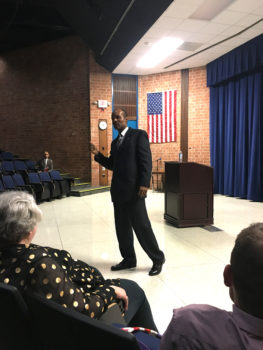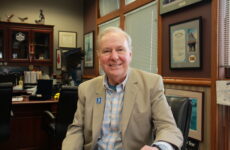
Dr. Claude Clegg of UNC-Chapel Hill spoke Oct. 25 in the Building 6 auditorium. Photo by Hilary Hamilton.
Most people don’t think of the United States as a point of departure, but Dr. Claude Clegg of the University of North Carolina-Chapel Hill, addressed 91 students on Oct. 25 to discuss Liberia, a nation with a history of Americans in exile.
It is typical, Dr. Clegg said, that United States’ history books don’t emphasize lessons on the people who “left the United States…that’s against our narrative.”
Liberia is a relatively small west African country about the size of the state of Tennessee. In order to understand Liberia’s history, he drew a connection between U.S. history and Liberian politics.
Dr. Clegg began with the American Revolution, which “did not resolve the original sin of slavery.”
The documents that the US nation was founded on, such as the Declaration of Independence and the United States Constitution were filled with majestic words in regard to rights, but there was a clear, unresolved issue of 700,000 slaves.
In 1790 was the first census, and twenty percent of the population were in chains, so it is easy, said Dr. Clegg, to “see the contradictions.”
The documents contained noble sentiments but there was also the institution of slavery, Dr. Clegg said, “an institution that is the absolute negation” of those ideas and principles the documents espoused.
Politicians and leaders recognized these contradictions; however, the issue was coming up with a solution; most were not in favor of eternal slavery or universal, immediate abolition.
“But the issue was larger than slavery,” Dr. Clegg said. “The issue also had to do with race. Africans in America could not, in any meaningful way, share in the rights that white Americans had.”
A small, vocal minority looked at Sierra Leone, set up in the 1780s to receive black people who had assisted the British. People in the United States began to take notice, and some liked the idea of colonization to address the problem of slavery and race.
It was likely that the majority of first generation Africans, whose frame of reference was still rooted in Africa, would have petitioned to be liberated and relocated to Africa.
It was backed by an organization called the American Colonization Society (ACS) started in 1916 and made up of Quakers, slave owners, free soilers, and gradual Emancipationists.
Free blacks, however, most likely wanted nothing to do with this relocation idea.
The slave owners who supported the ACS would have preferred to rid the world of those free men who were, Dr. Clegg mentioned, “a bad example” for their slaves. In addition, many wanted to “stay for the fight against slavery because their voice was important.”
Dr. Clegg imagined free blacks would have found the idea of being shipped to another country, where they were not born and had no experience with, as laughable and even offensive. Their fight for American citizenship was in the U.S.
This is where Dr. Clegg pointed out the intersection between the U.S. government and the ACS. Their opinions converged, and in 1819, $100,000 was provisioned to set up a west African “receptacle” to land Africans taken from slave ships, which had become illegal in 1808.
Thus, the country of Liberia was founded.
The issue with this new, American colony was that Liberians had not invited Americans or given away their lands.
Dr. Clegg pointed out that the black settlers had “come to reinvent what they had known in America, not to become Africans.”
Poverty, malaria, indigenous Africans and land struggles were a few of the struggles the nation was experiencing.
In relation to Liberia as DMACC’s international focus this year, Dr. Clegg said, “in this time when we’re encouraged to look inward, I think it’s excellent that a college would encourage you to engage outward.”
In a nation where, according to Dr. Clegg, “our national identity is bound up in being a nation of immigrants,” it’s certainly important to remember and learn from those who the nation failed.





Comments